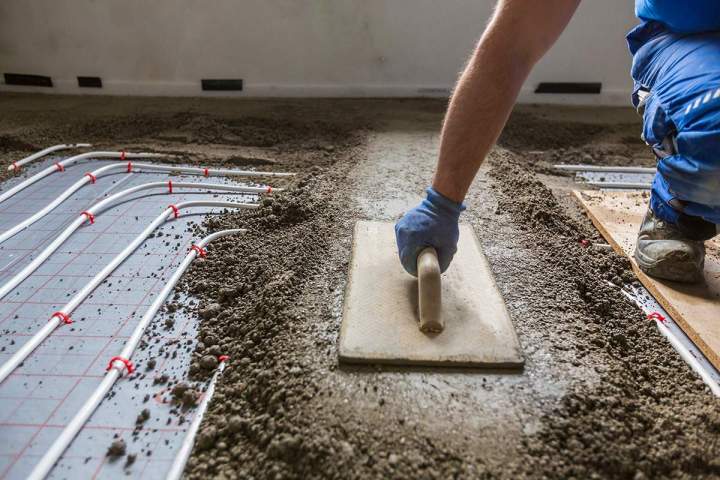Which concrete should you choose: lightweight or conventional?
Floor Microclimat / August 14, 2025
The choice of concrete plays a decisive role in the strength, performance, and even comfort of a building. The differences between lightweight concrete and conventional concrete are not limited to weight: strength, insulation, implementation... each type has its advantages and limitations. In this article, we provide an overview to help you select the most suitable concrete for your project.

Radiant floor with lightweight concrete:
Advantages:
- Reduced weight: Lightweight concrete is lighter than traditional concrete, which can be an advantage for buildings that do not have a very heavy structure or to avoid overloading floors.
- Better thermal insulation: This type of concrete contains materials such as perlite or expanded polystyrene, which provide good thermal insulation. This means that the heat from the floor is better retained, and you don't lose heat downwards. This is great for maximizing the efficiency of your radiant system.
- Easier installation: Since it is less dense, it is easier to handle, which can reduce installation costs and time.
Disadvantages:
- Lower strength: Lightweight concrete has lower compressive strength than conventional concrete. This can be a problem if you have heavy loads to support on your floor, or if you want maximum strength.
- Less suitable for large areas: If you have a large area to cover with radiant flooring (such as a large hall or garage), the lower strength of lightweight concrete could be a disadvantage, especially if it is subject to constant pressure.
- Sometimes higher cost: Some lightweight concretes can be more expensive to purchase, even though they offer good insulation benefits.
Radiant floor with conventional concrete:
Advantages:
- Excellent strength: Conventional concrete is much more resistant to compression, making it perfect for high-traffic areas or heavy loads. If you want to be sure that your floor can support weight without deforming, this is the right choice.
- Better thermal conductivity: It offers better thermal conduction. This means that heat will spread more quickly and evenly throughout the floor. It may be a little faster to heat the room, although lightweight concrete is also effective.
- Durability: Conventional concrete is more durable and resistant to cracking and wear over time. If you want a system that will last a very long time, this is a good choice.
Disadvantages:
- Heavy weight: Conventional concrete is much heavier, which can be a problem on sensitive structures or in homes where there are already weight restrictions.
- Less effective insulation: Unlike lightweight concrete, conventional concrete does not have natural insulating properties. An additional layer of insulation must therefore be added under the floor to prevent heat loss. This can increase the cost and installation time.
- Longer and more expensive installation: Due to its weight and density, conventional concrete can be a little more difficult to handle and install, which increases the amount of time required for the work.
In summary:
- If you're looking to lighten your floor while still benefiting from good thermal insulation, lightweight concrete can be an excellent choice. It's also easier to handle and reduces the total weight of the structure. Perfect for residential projects with fewer load constraints.
- If you want a more resistant and durable floor with better thermal conductivity, conventional concrete is probably what you need, especially if you are installing it in a large area or a space subject to heavy loads.